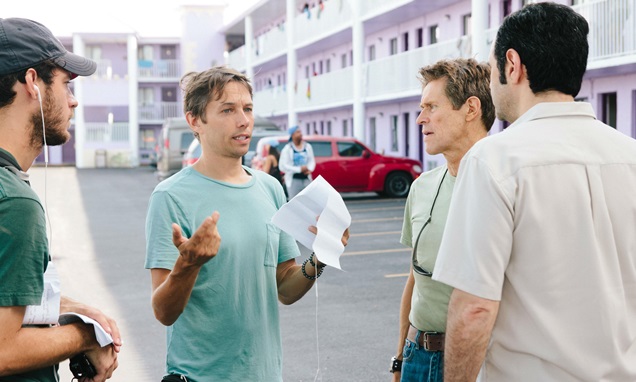Michael C. here. When I started this column I made a rule that anything less than two years old was too recent. So for the season finale let's go with a first round draft pick.
 Sean Baker and Willem Dafoe on the set of The Florida Project
Sean Baker and Willem Dafoe on the set of The Florida Project
Scene: Child Predator
There’s nothing that he can do about it. That’s the guiding principle that drives Willem Dafoe’s Bobby throughout Sean Baker’s heart-rending The Florida Project. He maintains the boundaries he needs to keep up the pretense that he is operating a motel and not a lilac-colored homeless shelter, but we can intuit that he would help more if he could. It’s all in the unnecessary helping of kindness and humor around the edges when he’s laying down the law...
It’s possible that Bobby occasionally indulges in a stray thought about a grand, selfless gesture like adopting one of the wayward children that populate his rundown motel. But experience has tempered that urge. He can do the math. The Florida Project focuses on the troubled mother and daughter pair of Halley and Moonee, but there were pairs like them before this story and there will be more to follow. Better for Bobby to keep his guard up if he doesn’t want to end up clinging to the bottom rung of society with his guests.
There is, however, one unforgettable moment in the film where Bobby can take direct action to fix a problem and the resulting scene reverberates through the rest of the film. I speak of course of the scene where Bobby violently expels a child predator who has creeped onto the motel grounds.

Sean Baker rightfully draws a lot of attention for the emotional content and social commentary of his films, but I think that focus may be causing us to somewhat overlook what a fantastic craftsman he is. Florida Project has an astonishing documentary verisimilitude but that doesn’t mean carelessly filmed or style-less. The sequence with the predator has a precision to it and an escalation that’s thrilling without calling attention to itself in a way that would shatter the realism. I particularly love the way Baker uses blocking to make us feel the shifting power dynamic between the two men, as Dafoe corners and physically intimidates the predator before he does anything overtly threatening. The use of longer takes is also great for building suspense as to when Dafoe’s simmering anger is going to boil over. The simple choreography keeps the shots from being the kind film nerds salivate over - they pretty much walk in a straight line - but it suits the material perfectly.
(And by the by, a round of applause to Carl Bradfield, who is stupendously off-putting as the old child molestor, the epitome of nailing a thankless role.)
But all this is preamble to discussing Dafoe’s powerhouse performance. Even in a career that has already seen its share of pinnacles, this scene is going to get a prominent place in the highlight reel. And it’s not simply the fist-pumping factor of watching Dafoe stick it to this monster, although that’s considerable. Since 2017 I judge a trip to the movies against whether or not it will be more satisfying than staying home and watching the GIF of Dafoe slapping the soda out of that bastard’s hand 500 times in a row.

When we first meet Bobby one can be forgiven for not getting all the fuss about Dafoe’s performance. He appears to have settled on the right note of exasperated patience and called it a day. But watching Dafoe’s practically shaking with rage as he first torments then drives off this creep is to realize how disciplined his performance is in the rest of the film. You can recognize this vein of fury bubbling under the surface in the other scenes and you realize how numb Bobby has had to make himself in order to live with that level of pent up frustration.
There’s a blink and you miss it moment at the end when the authorities show up to take Moonee into foster care. There is nothing Bobby can do to help. It’s awful and there’s no way around it. Bobby can’t chase off problems that are this deep and systemic. He is wandering off to emotionally shut down when he passes Moonee on the stairs. It is the last time he and Moonee will be in the film together though, in a typical show of restraint, Baker doesn’t underline this point. Dafoe simply pats Moonee on the head as she passes by. It lasts barely a second and Moonee doesn’t even notice. But he does it anyway. He can't stop himself from making a gesture of kindness, even if he knows the cost of engaging.

Season 1 of The New Classics
- Hedwig and the Angry Inch (2001)
- Y Tu Mama Tambien (2001)
- Sexy Beast (2001)
- Master and Commander (2003)
- Shattered Glass (2003)
- Before Sunset (2004)
- Collateral (2004)
- Eastern Promises (2007)
- Michael Clayton (2007)
- No Country For Old Men (2007)
- Happy-Go-Lucky (2008)
- The Hurt Locker (2009)
- Inglourious Basterds (2009)
- In the Loop (2009)
- I Am Love (2010)
- Meek's Cutoff (2010)
- A Separation (2011)
- Mission: Impossible - Ghost Protocol (2011)
- It's Such a Beautiful Day (2012)
- Blue Ruin (2013)
- 20th Century Women (2016)
- The Florida Project (2017)